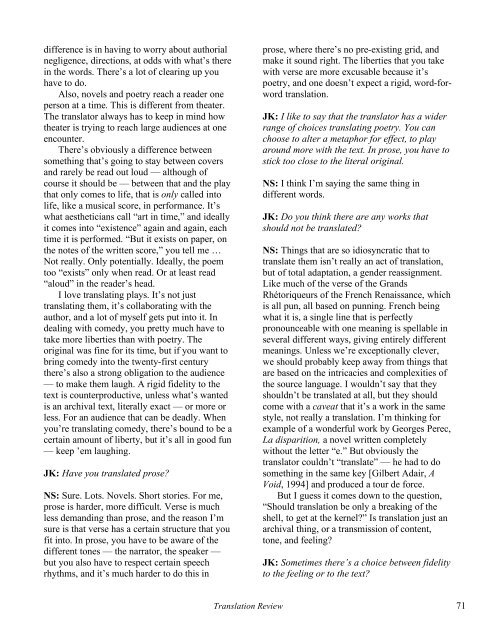Translation Review - The University of Texas at Dallas
Translation Review - The University of Texas at Dallas
Translation Review - The University of Texas at Dallas
Create successful ePaper yourself
Turn your PDF publications into a flip-book with our unique Google optimized e-Paper software.
difference is in having to worry about authorial<br />
negligence, directions, <strong>at</strong> odds with wh<strong>at</strong>’s there<br />
in the words. <strong>The</strong>re’s a lot <strong>of</strong> clearing up you<br />
have to do.<br />
Also, novels and poetry reach a reader one<br />
person <strong>at</strong> a time. This is different from the<strong>at</strong>er.<br />
<strong>The</strong> transl<strong>at</strong>or always has to keep in mind how<br />
the<strong>at</strong>er is trying to reach large audiences <strong>at</strong> one<br />
encounter.<br />
<strong>The</strong>re’s obviously a difference between<br />
something th<strong>at</strong>’s going to stay between covers<br />
and rarely be read out loud — although <strong>of</strong><br />
course it should be — between th<strong>at</strong> and the play<br />
th<strong>at</strong> only comes to life, th<strong>at</strong> is only called into<br />
life, like a musical score, in performance. It’s<br />
wh<strong>at</strong> aestheticians call “art in time,” and ideally<br />
it comes into “existence” again and again, each<br />
time it is performed. “But it exists on paper, on<br />
the notes <strong>of</strong> the written score,” you tell me …<br />
Not really. Only potentially. Ideally, the poem<br />
too “exists” only when read. Or <strong>at</strong> least read<br />
“aloud” in the reader’s head.<br />
I love transl<strong>at</strong>ing plays. It’s not just<br />
transl<strong>at</strong>ing them, it’s collabor<strong>at</strong>ing with the<br />
author, and a lot <strong>of</strong> myself gets put into it. In<br />
dealing with comedy, you pretty much have to<br />
take more liberties than with poetry. <strong>The</strong><br />
original was fine for its time, but if you want to<br />
bring comedy into the twenty-first century<br />
there’s also a strong oblig<strong>at</strong>ion to the audience<br />
— to make them laugh. A rigid fidelity to the<br />
text is counterproductive, unless wh<strong>at</strong>’s wanted<br />
is an archival text, literally exact — or more or<br />
less. For an audience th<strong>at</strong> can be deadly. When<br />
you’re transl<strong>at</strong>ing comedy, there’s bound to be a<br />
certain amount <strong>of</strong> liberty, but it’s all in good fun<br />
— keep ’em laughing.<br />
JK: Have you transl<strong>at</strong>ed prose?<br />
NS: Sure. Lots. Novels. Short stories. For me,<br />
prose is harder, more difficult. Verse is much<br />
less demanding than prose, and the reason I’m<br />
sure is th<strong>at</strong> verse has a certain structure th<strong>at</strong> you<br />
fit into. In prose, you have to be aware <strong>of</strong> the<br />
different tones — the narr<strong>at</strong>or, the speaker —<br />
but you also have to respect certain speech<br />
rhythms, and it’s much harder to do this in<br />
prose, where there’s no pre-existing grid, and<br />
make it sound right. <strong>The</strong> liberties th<strong>at</strong> you take<br />
with verse are more excusable because it’s<br />
poetry, and one doesn’t expect a rigid, word-forword<br />
transl<strong>at</strong>ion.<br />
JK: I like to say th<strong>at</strong> the transl<strong>at</strong>or has a wider<br />
range <strong>of</strong> choices transl<strong>at</strong>ing poetry. You can<br />
choose to alter a metaphor for effect, to play<br />
around more with the text. In prose, you have to<br />
stick too close to the literal original.<br />
NS: I think I’m saying the same thing in<br />
different words.<br />
JK: Do you think there are any works th<strong>at</strong><br />
should not be transl<strong>at</strong>ed?<br />
NS: Things th<strong>at</strong> are so idiosyncr<strong>at</strong>ic th<strong>at</strong> to<br />
transl<strong>at</strong>e them isn’t really an act <strong>of</strong> transl<strong>at</strong>ion,<br />
but <strong>of</strong> total adapt<strong>at</strong>ion, a gender reassignment.<br />
Like much <strong>of</strong> the verse <strong>of</strong> the Grands<br />
Rhétoriqueurs <strong>of</strong> the French Renaissance, which<br />
is all pun, all based on punning. French being<br />
wh<strong>at</strong> it is, a single line th<strong>at</strong> is perfectly<br />
pronounceable with one meaning is spellable in<br />
several different ways, giving entirely different<br />
meanings. Unless we’re exceptionally clever,<br />
we should probably keep away from things th<strong>at</strong><br />
are based on the intricacies and complexities <strong>of</strong><br />
the source language. I wouldn’t say th<strong>at</strong> they<br />
shouldn’t be transl<strong>at</strong>ed <strong>at</strong> all, but they should<br />
come with a cave<strong>at</strong> th<strong>at</strong> it’s a work in the same<br />
style, not really a transl<strong>at</strong>ion. I’m thinking for<br />
example <strong>of</strong> a wonderful work by Georges Perec,<br />
La disparition, a novel written completely<br />
without the letter “e.” But obviously the<br />
transl<strong>at</strong>or couldn’t “transl<strong>at</strong>e” — he had to do<br />
something in the same key [Gilbert Adair, A<br />
Void, 1994] and produced a tour de force.<br />
But I guess it comes down to the question,<br />
“Should transl<strong>at</strong>ion be only a breaking <strong>of</strong> the<br />
shell, to get <strong>at</strong> the kernel?” Is transl<strong>at</strong>ion just an<br />
archival thing, or a transmission <strong>of</strong> content,<br />
tone, and feeling?<br />
JK: Sometimes there’s a choice between fidelity<br />
to the feeling or to the text?<br />
<strong>Transl<strong>at</strong>ion</strong> <strong>Review</strong> 71

















